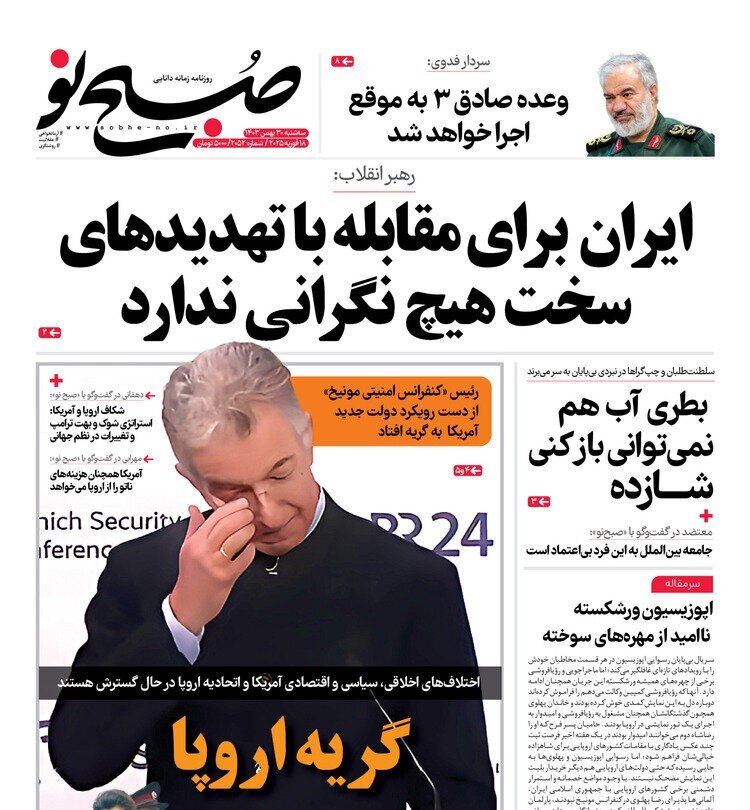Revolutionary rationality is the path to future

TEHRAN - In a note, Sobh-e-No discussed the manifestations of revolutionary rationality and wrote: One of the manifestations of revolutionary rationality is standing by the Axis of Resistance.
Contrary to the efforts of some to create a false dichotomy between the battlefield and diplomacy, the current government, relying on the establishment’s macro policies, has prioritized supporting the resistance. The result of this approach has been the successive victories of the resistance front and the strengthening of Iran's regional position. Convergence among political forces within the country, especially on issues such as foreign policy, can help consolidate the achievements of the Axis of Resistance. The support of Pezeshkian for the establishment’s macro policies indicates a deep understanding of international conditions and the necessity of maintaining unity against foreign pressure. Revolutionary rationality is the future path of the country. The existence of a leadership that determines the country's path with devisal is the greatest asset of the Islamic Revolution. Although there are challenges and obstacles on the path, these obstacles can be overcome and a bright future can be created for the country by relying on revolutionary rationality.
Ettelaat: Is an Israeli military attack on Iran feasible?
In an analysis, Ettelaat addressed the option of an Israeli military attack on Iran. It wrote: Can Netanyahu launch an attack on Tehran’s nuclear facilities alone? This option seems unrealistic. The U.S. president has repeatedly said that he wants a new agreement with Iran, the biggest regional enemy of the U.S. and Israel. Netanyahu has dedicated most of his political career to his main ideology, which is to confront Iran. By all accounts, Israel’s preferred option is military action. Israeli radicals, both inside and outside the country, have been advocating an attack on Iran’s nuclear facilities for years. Now, suffering from the illusion that Iran has been weakened after recent military developments in the region, they feel more empowered. If Trump takes the path of diplomacy, Netanyahu will be disappointed. There is no guarantee that diplomacy will work. Therefore, Netanyahu may be saved from the dilemma of either standing up to Trump or surrendering.
Jam-e-Jam: Trump undecided in face of Iran's barrier
In a commentary, Jam-e-Jam addressed the American confusion against Iran. The paper said: In the days when American and Zionist officials in Tel Aviv are speaking with language of threats against Iran, news has been published about Saudi Arabia's attempt to mediate between Tehran and Washington. This issue, more than anything, indicates America's confusion in confronting Iran and the repetition of a failed strategy; the repeated policy of "sticks and carrots" that America has used over the past decades to change the behavior of the Islamic Republic of Iran. Accordingly, America's foreign policy towards Iran is once again at a point of contradiction and confusion. Donald Trump, who previously called Iran "powerful" and admitted his inability to contain Tehran, has returned to the policy of threats and sanctions. Washington knows that the inevitable result of the maximum pressure policy will be a failure, but is unwilling to accept the new reality. Iran, which has resisted diplomatic games and hostile pressure for years, will not be intimidated by threats.
Donya-e-Eqtesad: Development of Chabahar Port is under influence of Gaza issue
Donya-e-Eqtesad dealt with the determination of Iran and India to overcome difficult conditions in an interview with Amin Rezaei Nejad, an expert on the Indian subcontinent. He said: To better understand the future of Iran-India political-economic relations under the Trump administration, some points should be considered. First, the alternative plan to develop Chabahar Port as a trade corridor for Indians has been stopped due to the Gaza issue. The second issue is that Trump is trying to implement the plan to relocate 2 million Gazan citizens to ensure the security of the Zionist regime by pressuring Arab countries. Trump has also threatened the member states of the Shanghai Cooperation Organization with tariff punishment. India is also a member of this organization. As a result, there are major tensions in India-U.S. relations. As a result, it can be concluded that the balance in the bargaining between New Delhi and Washington over Chabahar Port is a function of the progress of Donald Trump's Palestinian relocation plan. It seems that for Tehran to improve its relations with the Indian side, it must pursue its diplomatic moves at a point much further away from Chabahar Port, namely on the issue of the evacuation of Gazans and in greater unison with Jordan and Egypt.
Leave a Comment